
David Wagner, Undergraduate student, neuroscience
Maps creative genius in the brain
“David has excelled in tackling this complex and unique project. While studying genius and creativity, David has shown a lot of creativity himself. Undeterred by various challenges, David truly ‘dares to discover’: going forward to gather knowledge, even if there are obstacles in his way.” – Thomas Nickl-Jockshat, associate professor
Hometown: Spirit Lake, Iowa
Faculty mentor/advisor: Thomas Nickl-Jockschat, MD, associate professor, psychiatry, Carver College of Medicine
What is your degree program and anticipated graduation date? Bachelor of Science in Neuroscience, 2025
Please describe your research: My project involves analyzing task-based functional brain images (in addition to structural images) of well-known, famous creative geniuses compared to highly intelligent controls. Creative geniuses and control subjects underwent a series of neuropsychological tests, as well as three mental challenges known to test certain aspects related to creativity: verbal association, visual association, and abstract reasoning. The latter three tasks included sessions under fMRI technology, which provides a good measure of how creative geniuses’ brains are activating compared to non-creatives at the time creativity is happening.
In simple terms, why does this research matter? This research has important implications for understanding one of the most valuable human traits: creativity. Uncovering the neuroscience behind the basis of creative genius would significantly contribute to our knowledge of the human condition. Our research would also open up new opportunities for exploration into additional questions about creativity.
How soon after starting at the University of Iowa were you able to participate in research? I was able to volunteer as a bench assistant in research during my first year. I found my current lab as a sophomore.
How has being involved in research made you more successful at the University of Iowa? My time in research here has been one of my most profound experiences. Through this opportunity, I was able to fulfill my calling for investigation and solidify my dedication to the sciences. Through discovery in this research, I also discovered parts of myself.
What are your career goals and/or plans after graduation? I plan to apply to medical school so I can contribute good to the community while also continuing to push the field of psychiatry forward.
Banner location: Downtown—
